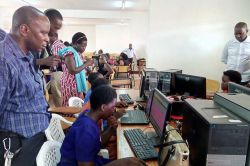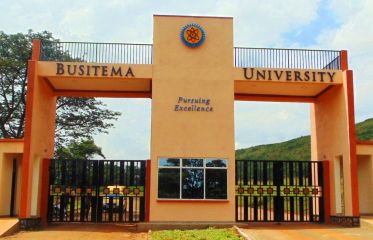Breaking News
- Flexible Remote Work Opportunity for University Students: Earn $100–$250 Per Month ...Read More
- Ministry of Education and Sports Azerbaijan Government Scholarships For 2025-2026 Academic Year ...Read More
- Government Sponsorship Undergraduate Admission Lists 2025-26 for Makerere University ...Read More
- Ministry of Education And Sports: Egyptian Government Scholarships 2025-2026 Academic Year ...Read More
- Ground Breaker Full Scholarship for girls to study Software Engineering 2025 July Intake ...Read More
- Tony Elumelu Foundation Entrepreneurship Programme (TEEP) 2025 for young African Entrepreneurs ...Read More
- DESIGNING FUTURES 2050 International Design Competition 2025 (€15,000 prize) ...Read More
- Ground Breaker Full time Scholarship for girls to study Software Engineering 2025 Intake ...Read More
- Ministry of Education And Sports Algerian Vocational Training Scholarships for 2024-2025 AY ...Read More
- Ministry of Education and Sports Advert for the Algerian Government Scholarships for 2024-2025 ...Read More
Meeting, Convention, and Event Planner
Coordinate activities of staff, convention personnel, or clients to make arrangements for group meetings, events, or conventions. Sample of reported job titles: Catering Manager, Conference Manager, Conference Planner, Conference Planning Manager, Conference Services Manager, Convention Services Manager, Director of Conference Services, Director of Events, Event Manager, Events Manager
Add to FavouritesDaily Tasks
1. Monitor event activities to ensure compliance with applicable regulations and laws, satisfaction of participants, and resolution of any problems that arise.
2. Confer with staff at a chosen event site to coordinate details.
3. Inspect event facilities to ensure that they conform to customer requirements.
4. Coordinate services for events, such as accommodation and transportation for participants, facilities, catering, signage, displays, special needs requirements, printing and event security.
5. Consult with customers to determine objectives and requirements for events such as meetings, conferences, and conventions.
6. Meet with sponsors and organizing committees to plan scope and format of events, to establish and monitor budgets, or to review administrative procedures and event progress.
7. Review event bills for accuracy, and approve payment.
8. Evaluate and select providers of services according to customer requirements.
9. Arrange the availability of audio-visual equipment, transportation, displays, and other event needs.
10. Plan and develop programs, agendas, budgets, and services according to customer requirements.
11. Negotiate contracts with such service providers and suppliers as hotels, convention centers, and speakers.
12. Maintain records of event aspects, including financial details.
13. Conduct post-event evaluations to determine how future events could be improved.
14. Organize registration of event participants.
Key Knowledge Areas
Customer and Personal Service — Knowledge of principles and processes for providing customer and personal services. This includes customer needs assessment, meeting quality standards for services, and evaluation of customer satisfaction.
English Language — Knowledge of the structure and content of the English language including the meaning and spelling of words, rules of composition, and grammar.
Clerical — Knowledge of administrative and clerical procedures and systems such as word processing, managing files and records, stenography and transcription, designing forms, and other office procedures and terminology.
Sales and Marketing — Knowledge of principles and methods for showing, promoting, and selling products or services. This includes marketing strategy and tactics, product demonstration, sales techniques, and sales control systems.
Administration and Management — Knowledge of business and management principles involved in strategic planning, resource allocation, human resources modeling, leadership technique, production methods, and coordination of people and resources.
Key Skills
Active Listening — Giving full attention to what other people are saying, taking time to understand the points being made, asking questions as appropriate, and not interrupting at inappropriate times.
Speaking — Talking to others to convey information effectively.
Critical Thinking — Using logic and reasoning to identify the strengths and weaknesses of alternative solutions, conclusions or approaches to problems.
Reading Comprehension — Understanding written sentences and paragraphs in work related documents.
Time Management — Managing one's own time and the time of others.
Coordination — Adjusting actions in relation to others' actions.
Service Orientation — Actively looking for ways to help people.
Social Perceptiveness — Being aware of others' reactions and understanding why they react as they do.
Judgment and Decision Making — Considering the relative costs and benefits of potential actions to choose the most appropriate one.
Monitoring — Monitoring/Assessing performance of yourself, other individuals, or organizations to make improvements or take corrective action.
Negotiation — Bringing others together and trying to reconcile differences.
Persuasion — Persuading others to change their minds or behavior.
Complex Problem Solving — Identifying complex problems and reviewing related information to develop and evaluate options and implement solutions.
Management of Personnel Resources — Motivating, developing, and directing people as they work, identifying the best people for the job.
Writing — Communicating effectively in writing as appropriate for the needs of the audience.
Active Learning — Understanding the implications of new information for both current and future problem-solving and decision-making.
Operations Analysis — Analyzing needs and product requirements to create a design.
Systems Analysis — Determining how a system should work and how changes in conditions, operations, and the environment will affect outcomes.






























































































